Model UN for ELLs: Language & Leadership Transcript
Joe Burkett: I'm Joe Burkett, I teach 9th grade World Studies in the ENLACE Program at Lawrence High School in Lawrence, Massachusetts. The ENLACE Program welcomes newcomers to the United States who are coming to us with a beginning level of English. We focus on giving them a grade-level cuticulum and, at the same time, developing their English language learning.
You are going to now transition into your expert group, right? You are delegates.
In today's lesson, students are focusing on the three major effects of climate change.
We're going to focus on extreme weather, threatened species, and rising sea levels. You're going to be working together to see how these effects of climate change are different for different groups of people, and then come to a decision about what they think is the most important effect of climate change.
Everybody is going to represent a different group today, similar to how you represent your countries during the model UN. But instead of a country, you're going to represent a group that is experiencing an effect of global climate change.
We've just finished a complete UN simulation cycle, in which students were focused on representing countries in the outbreak of a pandemic.
What I'm going to do is start with a roll call. Rainforest researchers.
Student: Present.
Joe Burkett: Islands of the Pacific.
Student: Present.
Joe Burkett: We are now entering another UN simulation cycle, which will be about climate change.
So, the first thing that I'm going to have you do is a seven-step vocabulary.
In order to introduce that, I wanted to kind of deep dive into the vocabulary. So, we used a seven-step model.
So, can we have you repeat after me. Rising.
Class: Rising.
Joe Burkett: Sea levels.
Class: Sea levels.
Joe Burkett: Could I have someone read the translation for me?
We move from there into a reading in which there was a short description of who their group was, why they were concerned about climate change, and why specifically they were being effected.
So you guys can decide in your groups, one partner will read and the other partners will annotate. What's one thing that we do when we annotate, Allen?
Allen: Cognates.
Joe Burkett: We look for cognates. What's the one that we added?
Student: Circle [crosstalk 00:02:30].
Joe Burkett: We circle new vocabulary words, words like climate change. And as [Mixael 00:02:38] said, we will do the "who did what." Seven minutes, here we go.
Student: We represent people ...
Joe Burkett: In the lesson today, the students didn't really know which level of text they were receiving. I made the decision based on the groupings that I had arranged them in. It just became a way for them to understand a perspective, and feel confident that they could then go and take that and have a conversation with the other groups in the room.
Student: The most effect was extreme weather. They have many storms and also they have potential to create flooding.
Student: So, the who did what.
Student: Who did what, the ocean.
Student: The ocean.
Student: [inaudible 00:03:29]
Student: The climate change is making the ocean rise and making more big and stronger storms.
Student: Mm-hmm (affirmative).
Joe Burkett: Now that you know a little bit about the group that you represent, we are going to use an un-moderated caucus as a way to understand the perspectives of other groups. On the back side of your sheet is the listening guide that we're going to use for our un-moderated caucus. First, what you need to do is fill in your group on the listening guide. Okay, so for example, what did we decide tornado survivors, what was their most ... Yes, Allen, what was the most major effect they were concerned about?
Allen: Extreme weather.
Joe Burkett: Extreme weather. And if I was in the un-moderated caucus, I would say, "Nice to meet you. I represent tornado survivors, my group is most concerned about extreme weather. Tornadoes are getting bigger, they're getting stronger and more destructive. And you'll be writing down each group's perspective here. And there's a space to show who agrees and who disagrees in terms of what is the most major effect of climate change.
A lot of sentence frames and language structures are built into the materials beforehand when we prepare them to enter the caucus.
What I'd like to do is if someone could motion for an un-moderated caucus, and we'll go for six minutes, okay? Farmers. You motioned for an ...
Student: Un-moderated caucus and the topic of the effect of climate change for six minutes.
Joe Burkett: All right, thank you farmers. Are we ready?
Class: Yes.
Joe Burkett: Okay. Let's go.
Student: Nice to meet you.
Student: Nice to meet you.
Student: I represent weather reporters.
Student: Yeah. [Spanish 00:05:30].
Student: We concern with extreme weather.
Student: I represent farmer, and my major effect is extreme weather.
Student: And I represent, elephant expert, the major effect is extreme ...
Student: What?
Student: Let's see. [Spanish 00:05:50].
Student: Extreme weather.
Joe Burkett: This is really the first day that we have had a discussion about the major effects of climate change.
Student: And [inaudible 00:06:01] or different?
Student: [Spanish 00:06:02] different.
Joe Burkett: I think that one of the great things about the UN structure is that, because they were used to this method of communication, they were kind of able to take a new idea and then have academic conversation about it.
So, [Wilme 00:06:19], are elephant experts similar or different to your ...
Wilme: Different.
Joe Burkett: Different, perfect.
I think we find it very important for our students to not just develop the reading and the writing habits of English language learners, but also really feel comfortable engaging in academic conversation. And model UN presents a really structured way to enter into that.
Why are the islands of the Pacific concerned with rising sea levels?
Resnio: Oh, because for example, in the [inaudible 00:06:49] say that we needs to find a solution to climate change, because if we don't try the levels will be continue to increase, and will threaten the life of all Pacific island nations
Student: Is that beautiful.
Joe Burkett: Threaten the lives of all Pacific island nations, nice job, [Resnio 00:10:59].
Student: So beautiful.
Resnio: Nice to meet you, my friend.
Joe Burkett: Nice, so professional.
Nice job guys. What I want you to do now is take a minute, this is your chance to think about who is similar to me, who is different and why?
So, the ocean rising is this effect, right>
Student: Yes.
Joe Burkett: But [Moises 00:07:29] also said animals can die. So, you don't have to stick to this opinion. If you've heard the perspective of all these other groups, you can change your opinion, right? When we do a vote for the resolution, now that you've learned other perspectives, you can vote how you'd like to vote. Right? Okay.
Student: Maybe it's threatened species, because if the animal get killed then it's going to be very harsh for us, because each animal have like a, like a different purpose.
Joe Burkett: Can I have a group, a delegation that would like to try to explain what they think is the most important effect of climate change? All right, islands of the Pacific, thank you.
Allen: My opinion that the most important effect of raising seas, level because like if the ocean entered to the city, that city submerged in water-
Joe Burkett: Wow.
Allen: ... so this mean that many species can die and extinction.
Joe Burkett: All right, so you respectfully disagree with the farmers, you think that rising sea levels are more important. I like how you used the word submerged, which was in your reading. Submerged means under water, covered by water. So, you think that if that happens to cities, it would be the most important effect of climate change. We have time for one more opinion. Thank you weather reporters.
Student: I think I disagree respectfully with Erikson, because I think-
Joe Burkett: With the islanders of the Pacific?
Student: With island of the Pacific, yes, because I think that the more important is like extreme weather, because it's okay that he says like it can submerge, right? But there going to be like places higher, then the water cannot get there. But if it's a storm, it can get like whatever it wants. So, it can destroy buildings, kill people, kill animals, so I this is the best, because this can be like, this is related with all of it.
Joe Burkett: On the topic of major effects of climate change, could we please vote on whether you are in favor of this motion? All in favor, raise your placards. We have one, two, three, four, five, six, seven ...
So as they go forward and they do this research about their countries and their perspectives, it'll help them understand that as they're writing, they will keep in mind that their perspective is going to be different from other countries, and that they need to provide evidence as to why their perspective is important, why they can be persuasive, and why eventually, we can come to a resolution together.
With a majority, we have a resolution that this class should focus on extreme weather as the most important effect of climate change. That's my gavel.
A little bit of time for an exit ticket, I want you to determine, do you agree with the resolution in class today? Yes, no, and why?
It's an exciting prospect for the kids, they really enjoy this idea of really taking ownership over a specific perspective. And it really allows them to kind of get into the role of a researcher.
Student: Thank you.

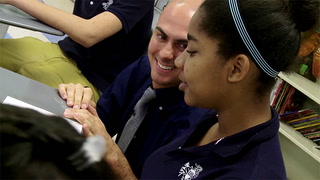
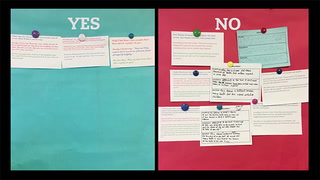
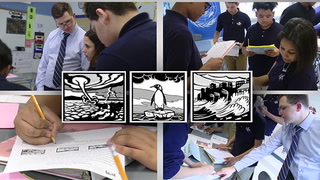
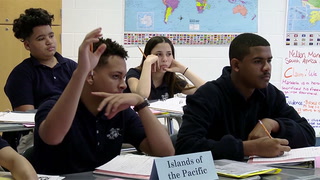
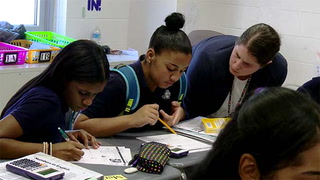
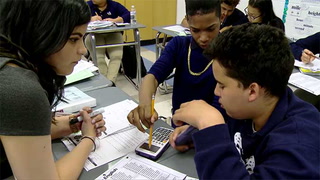
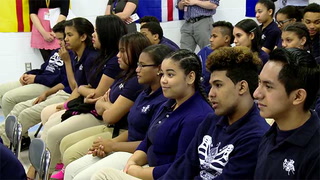









6 Comments
Brent Schmidt Sep 14, 2022 6:32pm
This video coves social awareness, relationship skills, and responsible decision making.
SWAU Educ/Psych Jan 27, 2020 1:52pm
This is an excellent way in which students are engaged ( reading, discussing and writing) in the learning process but the methods provided by Mr. Burkett allow for a sense of professionalism/ discipline in undertaking tasks. Mr. Burkett is also a good facilitator allowing for independent thinking too!
Cade Patterson Aug 26, 2019 5:43pm
This was a great way in demonstrating working with ELL students. In my future as a special education teacher I will be working with students who come from different cultural backgrounds as well as different disabilities that affect their speech, hearing, and learning disabilities so having different ways to communicate with the students.
Daniel Gallegos Jun 2, 2018 2:09am
James Fish May 23, 2018 11:53am